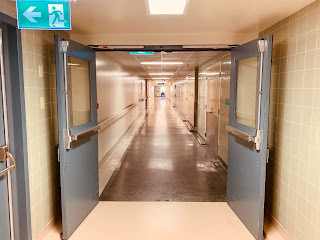Fall Prevention Measures Can Prevent Serious Injury
Supreme Court Justice Ruth Bader Ginsburg fell in her office
this week and fractured three ribs. She was hospitalized, but fortunately, is
now back home now and doing well, according to news reports.
Although the details of how the 85 year-old Supreme Court
Justice fell have not been released, the mishap shines a spotlight on how
serious a fall can be. It fact, a fall can be devastating for older adults in
particular because their bones are more fragile. They often break a hip,
sustain a severe head injury... or worse.
I would like to take this opportunity to wish Justice
Ginsburg well and remind everyone that measures can be taken to prevent falls
indoors. In your own home, or in the home of a loved one, these strategies can
help prevent an accident and keep people safe. Some of these measures can be
applied to the work environment, as well:
- Ensure that the home is free of hazards such as slippery floors, rugs that are not secured and poorly lit areas.
- Install handrails, grab bars and other safety devices.
- Wear properly-fitting shoes with nonskid soles.
- Engage in regular, moderate amounts of physical activity to maintain strength, coordination, agility and balance.
- Get an eye examination and physical each year, and wear glasses if
needed.
- Check with your doctor about side effects of all your prescription
and over-the-counter medications and take proper precautions. Medications can cause drowsiness and
interfere with balance.
- Eat a nutritionally balanced diet with adequate amounts of calcium
and vitamin D.
- Avoid excessive alcohol intake.
Stairs and
steps
- Make sure light switches are at both the top and bottom of the
stairs.
- Provide enough light to see each step and the top and bottom
landings.
- Keep flashlights nearby in case of a power outage.
- Install handrails on both sides of the stairway and be sure to use
them.
- Do not leave objects on the stairs.
- Consider installing motion detector lights which turn on
automatically and light your stairway.
- Put nonslip treads on each bare-wood step.
- Do not use patterned, dark or deep-pile carpeting. Solid colors
show the edges of steps more clearly.
- Do not place loose area rugs at the bottom or top of stairs.
- Repair loose stairway carpeting or boards immediately.
Bathroom
- Install grab bars on the bathroom walls near the toilet and along
the bathtub or shower.
- Place a slip-resistant rug adjacent to the bathtub for safe exit
and entry.
- Mount a liquid soap dispenser on the bathtub/shower wall.
- Place nonskid adhesive textured strips on the bathtub/shower
floor.
- Use a sturdy, plastic seat in the bathtub if you are unsteady or
if you cannot lower yourself to the floor of the tub.
- Stabilize yourself on the toilet by using either a raised seat or
a special toilet seat with armrests.
- Replace glass shower enclosures with non-shattering material.
- Keep a night light in the bathroom.
Bedroom
- Clear clutter from the floor.
- Place a lamp and flashlight near your bed.
- Install night-lights along the route between the bedroom and the
bathroom.
- Sleep on a bed that is easy to get into and out of.
- Keep a telephone near your bed.
Living
areas
- Arrange furniture to create clear pathways between rooms.
- Remove low coffee tables, magazine racks, footrests and plants
from pathways in rooms.
- Install easy-access light switches at entrances to rooms so you
won’t have to walk into a dark room to turn on the light. Glow-in-the-dark
switches may be helpful.
- Secure loose area rugs with double-faced tape or slip-resistant
backing. Recheck these rugs periodically.
- Keep electric, appliance and telephone cords out of your pathways,
but don’t put cords under a rug.
- Eliminate wobbly chairs, ladders and tables.
- Do not sit in a chair or on a sofa that is so low it is difficult
to stand up.
- Place carpeting over concrete, ceramic and marble floors to lessen
the severity of injury if you fall.
- Repair loose wooden floorboards immediately.
Kitchen
- Remove throw rugs.
- Immediately clean up any liquid, grease or food spilled on the
floor.
- Store food, dishes and cooking equipment at easy-to-reach
waist-high level.
- Don’t stand on chairs or boxes to reach upper cabinets. Use only a
step stool with an attached handrail so you are supported.
- Repair loose flooring.
- Use nonskid floor wax.



Comments
Post a Comment